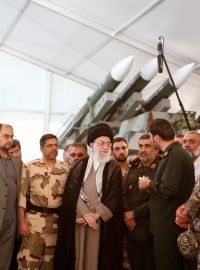
(CNSNews.com) – Iran pledged Tuesday to retaliate after the Trump administration coupled its certification of the regime’s compliance with the nuclear deal with new sanctions targeting the ballistic missile program and the Islamic Revolutionary Guard Corps (IRGC).
Calling the new measures “contemptible and worthless,” the foreign ministry said Iran would respond by imposing sanctions against American individuals and entities that have taken hostile steps against Iran and “other Muslim nations in the region.”
The State and Treasury Departments announced the U.S. has designated 18 individuals and entities, including some based in China and Turkey, for supporting the missile program, Iranian military procurement, or the IRGC – the powerful military organization that has been behind terrorism directed at the U.S., Israel and Jews since the early 1980s, and is deeply involved in propping up the Assad regime in Syria.
Among those targeted Tuesday were an Iran-based transnational criminal organization and three people associated with it.
The organization, the Ajily Software Procurement Group “uses hackers to steal engineering software programs from the United States and other western countries,” said the Treasury Department.
“Some of this software was sold to Iranian military and government entities, which are unable to acquire it overtly because of U.S. export controls and sanctions. The hackers use computer servers located in multiple Western countries to carry out their thefts.”
The administration linked Tuesday’s measures with a certification to Congress that Iran is complying with its commitments under the Joint Comprehensive Plan of Action (JCPOA) nuclear agreement.
As a result, the administration informed Congress it will continue to waive nuclear-related sanctions to comply with U.S. JCPOA obligations.
It was the Trump administration’s second such certification, required by law every 90 days.
State Department spokeswoman Heather Nauert made it clear the certification did not mean the administration – which is conducting a review of the JCPOA and associated sanctions relief – believes Iran is embracing the “spirit” of the agreement.
She noted in a statement that according to the JCPOA text, the countries involved anticipate that full implementation “will positively contribute to regional and international peace and security.”
“However, Iran’s other malign activities are serving to undercut whatever ‘positive contributions’ to regional and international peace and security were intended to emerge from the JCPOA,” she said.
The new sanctions are being imposed under two executive orders – one (E.O. 13382 of 2005) dealing with proliferators of weapons of mass destruction and WMD means of delivery and those who support proliferation, and the other (E.O. 13581 of 2011) targeting transnational criminal organizations.
“These sanctions target procurement of advanced military hardware, such as fast attack boats and unmanned aerial vehicles, and send a strong signal that the United States cannot and will not tolerate Iran’s provocative and destabilizing behavior,” said Treasury Secretary Steven Mnuchin. “We will continue to target the IRGC and pressure Iran to cease its ballistic missile program and malign activities in the region.”
The measures stopped short of designating the IRGC under E.O. 13224, a post-9/11 order designed to disrupt funding to terrorists. There have been growing calls for the Trump administration to take that step – or the even more far-reaching one of designating the IRGC as a foreign terrorist organization (FTO).
In 2007 President Bush used E.O. 13224 to designate the IRGC’s Qods Force for providing support to terrorists, citing Hezbollah, three Palestinian terror groups, and the Taliban. But Iran experts have told Congress that the Qods Force is an inseparable part of the IRGC, which should be designated in its entirety.
Iran engagement proponents, on the other hand, argue that blacklisting the IRGC would risk a violent backlash.
On Monday, Iran armed forces chief Maj. Gen. Mohammad Hossein Baqeri issued a direct threat along those lines, warning Washington that naming the IRGC a terrorist group “would be a big risk to the US and its bases and forces stationed in the region.”
In response to threats to target the missile program, Baqeri declared that Iran’s missiles would not be “subject to bargaining and negotiation at any level.”
Both the missile program and IRGC are targeted in new bipartisan legislation that passed the Senate last month.
The legislation, which has been sent to the House of Representatives, mandates sanctions against the IRGC as a whole, under E.O. 13224.
‘An environment of uncertainty’
The National Iranian American Council (NIAC), which advocates engagement with Tehran, on Tuesday criticized the administration’s approach.
“While the Trump administration certified Iran’s compliance with the JCPOA with one hand today, it continues to undermine the nuclear accord with the other by undermining the sanctions relief process,” said NIAC president Trita Parsi.
He accused the administration of having “deliberately created an environment of uncertainty by consistently questioning the validity of the JCPOA, hinting that the U.S. might quit the agreement, and by suggesting that it might pursue regime change in Iran.”’
Iran complained to the U.N. last month that Secretary of State Rex Tillerson was advocating “regime change.”
In fact, in an appearance before the House Foreign Affairs Committee, Tillerson said it was administration policy to “work toward support of those elements inside of Iran that would lead to a peaceful transition of that government.”
“Those elements are there certainly, as we know,” he added, without elaborating.
One group that does call for regime change in Tehran, the exiled National Council of Resistance of Iran (NCRI), welcomed the new sanctions, and reiterated its calls for the IRGC to be designated “as a terrorist entity” and to be expelled from the region, particularly from Iraq and Syria.
“A firm approach is the only correct policy vis-à-vis a regime, which is the world’s most active state sponsor of terrorism and extremism,” it said.









